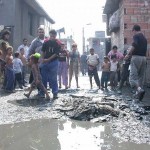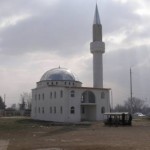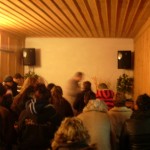Church of God Missional Message 3
Church of God Missional Message 2
Easter at the Bulgarian Church in Houston
Palm Sunday at the Bulgarian Church in Las Vegas
 When you think of Las Vegas, the first things that flood your mind are negative. One automatically associates this city with aspects, which you would feel uncomfortable referencing in a Christian newsletter. Therefore, you question if it is appropriate to even mention that you ministered in “Las Vegas” because of the negative connotation with simply saying these words. Yet, when you really come to think about it, is not the Gospel for the sinners and what better place to bring the Gospel than to a city that takes pride in its alias “Sin City?”
When you think of Las Vegas, the first things that flood your mind are negative. One automatically associates this city with aspects, which you would feel uncomfortable referencing in a Christian newsletter. Therefore, you question if it is appropriate to even mention that you ministered in “Las Vegas” because of the negative connotation with simply saying these words. Yet, when you really come to think about it, is not the Gospel for the sinners and what better place to bring the Gospel than to a city that takes pride in its alias “Sin City?”
When ministering in Mississippi this year, we attended a biker church, which carries the slogan “Sinners Welcomed, Others Tolerated.” This should be the mindset of righteous Christians; however, for the most part this is not true. Sinners make us uncomfortable. Sinners are “dirty.” The motto of most churches today should read: “Sinners Tolerated, Others Welcomed.”
Regardless of being “too righteous”, we did go to Las Vegas and we did minister there. When the Lord tells you to “GO” you do not question His command. Even when you know it will make you uncomfortable, you still go. Or you end up like Jonah.
Las Vegas is the home to a growing Bulgarian community, which has already established not one, but two Bulgarian churches with solid ministry presence in the area. They serve as a lighthouse to the European Immigrants in a place where it is hard to keep your faith.
On Palm Sunday we delivered a message on a traditional topic in a nontraditional way and spoke about The Price of the Kingdom. We were also able to spend time with the pastoral family who is currently seeking denominational affiliation and assist them in obtaining a website for their church. Their hope is to be able to inform other Bulgarians in the Las Vegas area of the new church, to provide a presence among the network of Bulgarian Churches in North America and hopefully begin broadcasting their services LIVE in the near future in order to reach more souls for the Kingdom.
When a Christian thinks of Las Vegas, the first things that flood the mind are negative. But after having ministered the Gospel in the midst of “Sin City,” you cannot stop thinking about the potential for saved human souls. For the Gospel was not given for our weekly Sunday morning entertainment, but rather for the salvation of the sinner. If we wish for Revival to go on, we must continue to preach the Gospel of the Kingdom to all the world, which includes even Las Vegas, Nevada.
At Biker’s Church in Mississippi
At the Antioch Project Church in Sliven
We were blessed to visit the Antioch Project Church in Sliven again, where long-term friends of ours have focused their prayers and efforts on a vision to reach one of the poorest communities in Bulgaria with the Gospel of Salvation. And their prayers have been answered in full.
Their church is growing, as they minister to both adults and children. The Sunday night service, in which we ministered, was full packed. Famous Bulgarian folk singer, Kondio, who was saved in prison two years ago, is a member of this church and is now planning to record a Christian album for Christmas. The congregation has established itself as a beacon in the community and is getting involved in a building program that will give them the opportunity to worship in a place of their own. It was a challenge to get a building permit in a city where several mosques are active. Nevertheless, the church’s ministry is extending to may areas of life and we were delighted to participate in what turned to be a prophetic service for both the people of the Antioch Project Church and our ministry team as well.
At the New Church in Drajhevo
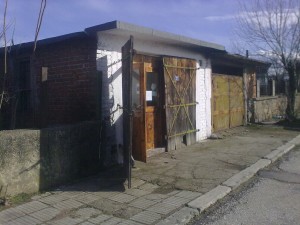 During our travels for the ministry we visit all sorts of churches. Sometimes, we minister at the finest buildings, accompanied by skillful worship teams in the comfort of nice air-conditioned and well-lighted environment. Other times, we go and minister to small village congregations gathering in old garages where we have to go dressed with layers in order not to freeze during preaching. But the Spirit is always the same.
During our travels for the ministry we visit all sorts of churches. Sometimes, we minister at the finest buildings, accompanied by skillful worship teams in the comfort of nice air-conditioned and well-lighted environment. Other times, we go and minister to small village congregations gathering in old garages where we have to go dressed with layers in order not to freeze during preaching. But the Spirit is always the same.
The church where we ministered this past Sunday is located in the village of Drajhevo, just a few kilometers east from the main road connecting the towns of Yambol and Sliven in Bulgaria. There have been evangelical Christians there since the great crusades of the 1990s. But the small congregation began gathering just a few years ago. They have reconstructed an old garage, where bread is being sold during the week, into a sanctuary. Similar to the Azusa Street Mission, they have no pulpit and use an empty bread crate for one on Sunday. But the Spirit is always the same.
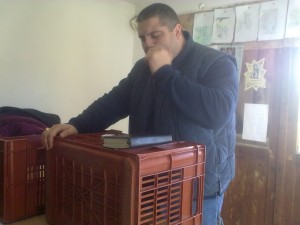 We entered the small place where some 30 people of God gather for services every week and we did not know what to expect. But when the power and glory filled the room, it was clear that God is at work in the midst of the new congregation in Drajhevo. Worship was accompanied only with a hand drum, but it was still as powerful as it could be. We delivered the message that all shall be well with those who remain in God’s righteousness. During the time of prayer and testimony when looking into the eyes of those present, you could see much hurt and sorrow. Yet, when service concluded we witnessed the transformation of heartaches to joy with the reassurance that all is going to be well with those whom remain righteous. In these difficult economic times, this is the only constant. God is the only absolute. For the Spirit is always the same. And the Spirit always remains faithful to those whom remain faithful.
We entered the small place where some 30 people of God gather for services every week and we did not know what to expect. But when the power and glory filled the room, it was clear that God is at work in the midst of the new congregation in Drajhevo. Worship was accompanied only with a hand drum, but it was still as powerful as it could be. We delivered the message that all shall be well with those who remain in God’s righteousness. During the time of prayer and testimony when looking into the eyes of those present, you could see much hurt and sorrow. Yet, when service concluded we witnessed the transformation of heartaches to joy with the reassurance that all is going to be well with those whom remain righteous. In these difficult economic times, this is the only constant. God is the only absolute. For the Spirit is always the same. And the Spirit always remains faithful to those whom remain faithful.
Bulgarian Church of God Congregations in the Capital Sofia
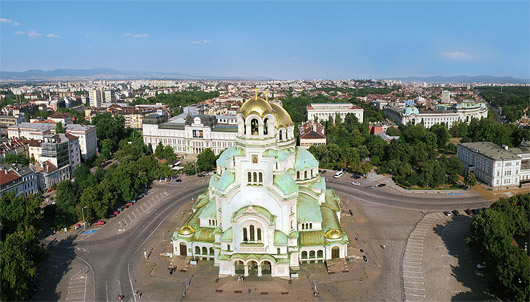 During our ministry in Bulgaria we often travel to the capital Sofia as the obligations of our ministry position necessitates that we minister there several times a month. Sofia has grown tremendously since we began ministering there in the early 90s. As a modern European capital it has drawn both investors and work force from many foreign countries and most of Bulgaria’s towns as well. The result is some 3 million people population, which account for about half of the Bulgarian nation, living and working in the capital Sofia.
During our ministry in Bulgaria we often travel to the capital Sofia as the obligations of our ministry position necessitates that we minister there several times a month. Sofia has grown tremendously since we began ministering there in the early 90s. As a modern European capital it has drawn both investors and work force from many foreign countries and most of Bulgaria’s towns as well. The result is some 3 million people population, which account for about half of the Bulgarian nation, living and working in the capital Sofia.
Currently, the Bulgarian Church of God has three Bulgarian congregations active in the territory of Sofia, not counting the Roma Gipsy churches and the multiple home groups at various suburbs and locations. These congregations are: (1) Grace Church of God, (2) Crossroads Church of God and (3) Fire Church of God.
1. The Grace Church of God is the oldest active Bulgarian Church of God congregation in Sofia. It owns its own building built in the north suburbs of the city with substantial help of Church of God World Missions. This is the church that mostly resembles the old practices of the Bulgarian Church of God, often forgotten by the congregations of the new generation. Thus, the role of this church is important as a protector of the identity and praxis of the historical Church of God, which has been ministering in Bulgaria since 1928.
2. The Crossroads Church of God is a relatively new congregation envisioned and formed around the dawn of the century. The church was initially formed around the growing youth group of Sofia’s Central Church of God to give one centralized location in the capital, where both students and professionals can worship together. It averages about 100 people who rent an auditorium west of downtown Sofia once a week on Sunday night for their church service.
3. The Fire Church of God began just a few years ago in the downtown location where the Crossroads Church previously met. The congregation is small, but growing attracting with its ministry young and knowledgeable people from all walks of life. The people of the Fire Church recently renewed their monthly revival services with special focus on healing and miracles.
Ministering at the Fire Church of God in Sofia
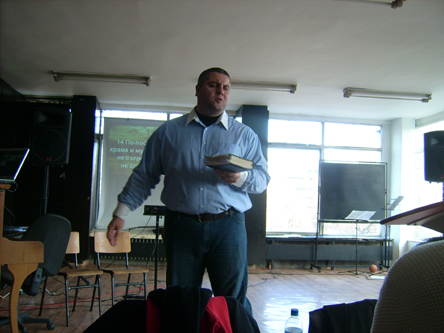 Returning to minster at the Fire Church of God in Sofia was a special event for our team. Many of the members there, as well as the pastor’s family, have been friends of ours and pastors in the ministry for a long time now. We have worked with Church of God Sofia regional overseer, Daniel Kirov and his team since 2002 when he first moved to Sofia with a vision to plant a church. Since then, his vision has become a reality in the capital as the Fire Church of God is one of the few active Church of God congregations in the largest metropolitan area in Bulgaria.
Returning to minster at the Fire Church of God in Sofia was a special event for our team. Many of the members there, as well as the pastor’s family, have been friends of ours and pastors in the ministry for a long time now. We have worked with Church of God Sofia regional overseer, Daniel Kirov and his team since 2002 when he first moved to Sofia with a vision to plant a church. Since then, his vision has become a reality in the capital as the Fire Church of God is one of the few active Church of God congregations in the largest metropolitan area in Bulgaria.
This time, we were able to focus on the new Bulgarian translation of the Bible, which we have now prepared for print, and present to the congregation an interactive Bible study from the Gospel of John. It was encouraging again to watch the small, but growing congregation, interpret the Bible corporately in a Bible study that enlightens the mind and transforms the soul. It was the way the Bible was intended to be read and interpreted, understood and lived – among true brothers and sisters.
Bible School and Services at the Mission Church in Sofia
We are just returning from a powerful weekend of teaching in Sofia. With temperatures below zero and snow covering the larger part of Bulgaria, we travelled to the capital city to minister at the Mission Church there. The church is only a couple of years old, but we have worked with the pastor and the leadership team for over a decade now as part of our Church of God ministry and the Bulgarian Chaplaincy Association as well.
Since April, 2009 the Mission Church has had services in the heart of the Sofia metropolitan of some 2.5 million people living in it. The church started with a handful of folks and now has some 120 members in their regular meetings, a Bible school, home group program, arts program and a very powerful praise team and choir that have held several successful concerts already.
Our visit was connected with a series of lectures on New Testament interpretation at their Bible school and ministering in their Sunday service. Although the school has only 30 students, we felt a powerful presence during the lectures and were able to extend the material and connect on a more personal level with the students. Naturally, the Sunday service became a great continuation of what we had already completed with the students. During the first song of worship, a demon possessed man ran to the altars screaming and rolled on the ground, only to be delivered a few minutes later. Then, the preaching took the attention of the people in the congregation, followed by an alter service in which many rededicated their lives praying to God to bring them to a new spiritual level in their Christian walk. Along with the pastor and his family, we were blessed to observe the Word working within the people and changing their lives forever.












